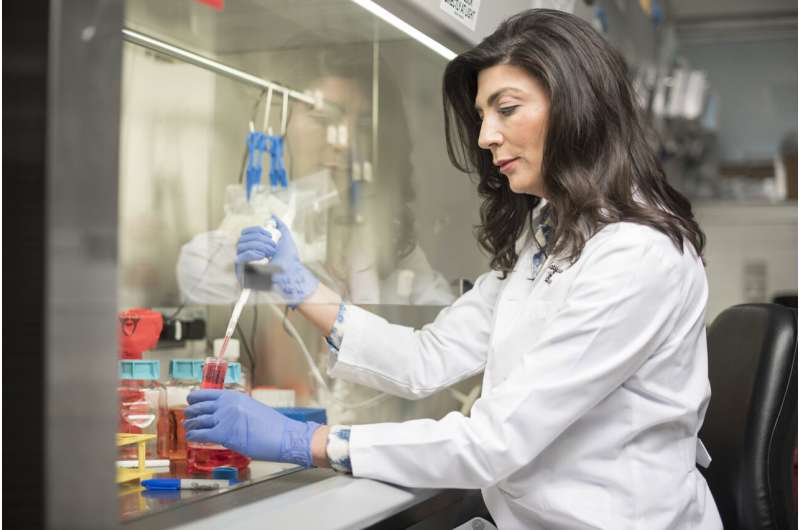Dual-targeting CAR NK cells can prevent cell dysfunction and tumor escape


Researchers at The University of Texas MD Anderson Cancer Center have developed a new approach to engineering natural killer (NK) cells with a second chimeric antigen receptor (CAR) to act as a logic gate, requiring two signals to eliminate a target cell. In preclinical studies, these next-generation CAR NK cells improved tumor specificity and enhanced anti-tumor activity by overcoming a process that contributes to NK cell dysfunction and tumor relapse.
This study, published today in Nature Medicine, demonstrated that a normal physiological process called trogocytosis contributes to tumor escape and poor responses after CAR NK cell therapy by causing tumor antigen loss, NK cell exhaustion and fratricide—the killing of sibling CAR NK cells.
“We identified a novel mechanism of relapse following CAR NK cell therapy, and we also have developed a strategy to mitigate this process,” said corresponding author Katy Rezvani, M.D., Ph.D., professor of Stem Cell Transplantation & Cellular Therapy. “We engineered CAR NK cells with dual-targeting CARs that are able to ignore tumor antigens on the surface of their sibling NK cells acquired as a result of trogocytosis and selectively eliminate tumor cells.”
Rezvani and Ye Li, M.D., a graduate student in the Rezvani Lab, led the study.
During trogocytosis, surface proteins from a target cell are transferred to the surface of an immune cell, such as an NK cell or T cell, in order to regulate their activity. Using preclinical models, Li and colleagues showed that CAR activation promotes trogocytosis, resulting in the transfer and expression of tumor antigens on CAR NK cells.
This results in both a decrease of target antigens on tumor cells as well as CAR NK cell fratricide, in which the engineered cells target one another rather than the tumor. Self-targeting leads to NK cell exhaustion, metabolic dysfunction and a weakened anti-tumor response.
By studying clinical samples from patients with lymphoid malignancies treated with anti-CD19 CAR NK cells on a clinical trial, the researchers confirmed that higher levels of the CD19 antigen on CAR NK cells were associated with lower levels of CD19 on tumor cells and a higher probability of relapse.
To stop this process from occurring, the researchers added an inhibitory CAR designed to recognize a marker unique to NK cells, resulting in CAR NK cells receiving a ‘don’t kill me’ signal when interacting with their siblings, even if they have the tumor antigen on their surface. In preclinical models, these logic-gated CAR NK cells were better able to focus on and attack only the tumor cells, reducing the frequency of NK cell exhaustion and fratricide, and improving anti-tumor activity.
“It’s important to prevent tumor escape following CAR NK therapy because that has led to relapse in some patients. By preventing exhaustion and fratricide in CAR NK cells, we can further improve their activity and function,” Rezvani said. “We are excited to translate this research to the clinic, as this is something that could be applied to any CAR NK cell therapy.”
Source: Read Full Article